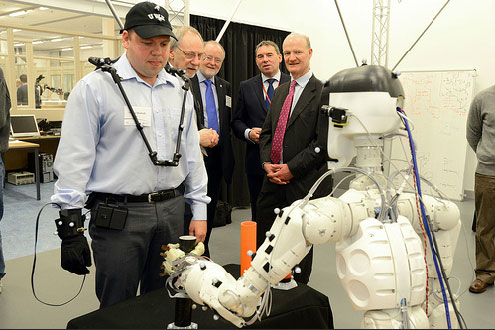| Nov 13, 2012 |
Robotics set to 'revolutionise the UK economy in the next 20 years'
|
|
(Nanowerk News) Britain’s desire to be at the forefront of robotics research has been reinforced by universities minister David Willetts, who saw world-leading technology when he visited the Bristol Robotics Lab yesterday [Monday, 12 November].
|
|
He wanted to see first-hand the cutting-edge technology being developed at the BRL, which is the largest robotics lab of its type in the UK and a joint collaboration between the University of Bristol and UWE Bristol.
|
 |
| David Willetts at the Bristol Robotics Lab.
|
|
The visit follows the Government’s identification of robotics and autonomous systems as one of eight ‘future technologies’ – important areas in which it hopes Britain can capitalise on current expertise to become world-leaders.
|
|
In his speech last week, Chancellor George Osborne outlined his vision for science in the UK and predicted that robotics has the scope to revolutionise the economy and society over the next 20 years, giving the BRL as an example of where such innovative research is taking place into a wide range of areas.
|
|
Mr Willetts, the Minister of State for Universities and Science, was shown projects which could revolutionise the medical industry - from robots which might one day be able to carry out surgery to groundbreaking work to develop tactile robots which have the potential to feel what’s happening inside someone’s body.
|
|
He also met staff and students who have worked with local schools to excite pupils about robotics, supporting the Government’s desire to get more youngsters interested in STEM subjects – science, technology, engineering and maths.
|
|
Among those he met was former UWE Bristol student Zan Nadeem, who established start-up business Restech after graduating with a first class BSc in Robotics. Restech aims to be the leading provider of after-school robotics clubs and workshops for primary and secondary schools, initially in Bristol.
|
|
Mr Willetts said: “It’s always fascinating to visit the BRL and to see their latest projects. It’s a prime example of academia working with industry to the benefit of the whole country. It also supports local schools to engage youngsters with robotics and encourage them to pursue STEM subjects in the future.
|
|
“The Government has identified robotics and autonomous systems as a ‘future technology’ – an area which has huge potential for growth. We predict that robots that can act independently of human control will revolutionise our economy and society in the next 20 years. We want Britain to be at the forefront of these world-changing breakthroughs.”
|
|
Year 9 pupils from Worle School, in Weston-super-Mare, and Orchard School in Horfield, Bristol, were also shown around the £1.65 million facility, which covers a total area of around 2,400sq metres, with over 300m of specialised laboratory space and two flying arenas.
|
|
Professor Chris Melhuish, Director of BRL, said: “We were delighted to welcome David back for his third visit to the BRL and it was encouraging to hear him say that he enjoys coming here to see what exciting projects we’re working on.
|
|
“It was very rewarding to hear the Chancellor’s announcement last week that robotics is now regarded as an important ‘future technology’ for the UK. Robots will work for us and with us in the future and the potential impact of this is huge, having a bearing on sectors such as defence, healthcare, manufacturing, transport, entertainment and education. Everyone working here is certainly excited about what the future holds and it’s good to know the Government shares this enthusiasm.”
|

